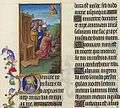Psalm 6
_-_BL_Add_MS_37421.jpg)
Psalm 6 is the 6th psalm from the Book of Psalms. The Psalm gives its author as King David and traditionally this has been accepted. David's supposed intention in writing the psalm was that it would be for anyone suffering from sickness or distress or for the state of Israel while suffering through oppression.[1]
The Geneva Bible (1599) gives the following summary:
- When David by his sins had provoked God’s wrath, and now felt not only his hand against him, but also conceived the horrors of death everlasting, he desireth forgiveness. 6 Bewailing that if God took him away in his indignation, he should lack occasion to praise him as he was wont to do while he was among men. 9 Then suddenly feeling God’s mercy, he sharply rebuketh his enemies which rejoiced in his affliction.
The psalm is the first of the seven Penitential Psalms, as identified by Cassiodorus in a commentary of the 6th century AD. Many translations have been made of these psalms, and musical settings have been made by many composers.
Psalm 6 in medieval illumination
The psalm was frequently chosen for illumination in medieval Books of Hours, to open the section containing the penitential psalms.
-

The Très Riches Heures du Duc de Berry (15th century)
-

A Book of Hours from Namur
-

A 15th-century Book of Hours from the south of France. Surrounding the penitents are the dead in their graves.
Themes
From Augustine Enarrationes[2] till Eduard König and the advent of the form-critical method in the early 20th century this was considered one of the penitential psalms. [3]
Since then Hermann Gunkel has classed it as a one of the Individual Lamentations,[4] as one of the"Sick Psalms".
For Martin Luther 6th Psalm is very important. From this, it provides various central points of his theology firmly: The hostility of the enemies should not be accepted by the enemy, but from God. Who look at the people who will impatiently The one who prays should be afraid of the wrath of God and ask that he should be punished as a child of God Only those who considered himself lost, could receive the help of God. Psalm 6 is in three parts, distinguished by the person.
- First, the psalmist addresses God and
- speaks for himself, and
- finally speaks to his enemies.
The psalmist expresses his distress in parts 1 and 2 and uses a rich palette of words to describe this distress, "powerless," "bone shaking," "extreme distress". He even expresses his distress by the excessiveness "of tears bathed layer", "eye consumed by grief," ...
In stating the enemies of the Psalmist, we understand that this distress is caused by relational problem. But it is unclear if he is innocent. However, he says he will be reinstated and that his opponents will be confounded. Trouble seems primarily psychological, but is also expressed through the body. It is as much the body as the soul of the psalmist cries out to God. In fact, it is also touched in his spiritual being, faced with the abandonment of God. In the absence of God emerges the final hope of the Psalmist, expressed confidence cry in the last three verses.
Heading
The Psalm header can be interpreted in different ways:[5]
- As an indication for the conductor
- for the musical performance (stringed instruments)
- eschatological in view of the end times (which lowers the potentially incorrect translation of the Septuagint close)
Uses
Catholic
According to the Rule of St. Benedict(530AD), Psalm 1 to Psalm 20 were mainly reserved for premium offices. According to the Rule of St. Benedict,(530) it was used on Monday, in the premium office after the Psalm 1 and Psalm 25. In the Liturgy of the Hours as well, Psalm 6 is recited or sung to the Office of Readings for Monday of the first week.[6]
Music
In the Rule of St. Benedict the psalm is sung "At Prime on Monday with three other psalms, namely Psalm 1, Psalm 2 and Psalm 6." The psalm formed the basis of the hymn "Straf mich nicht in deinem Zorn" (Do not punish me in your anger) by Johann Georg Albinus (1686, excerpt; ECG 176). The French composer Henry Desmarest used the psalm in the work "Grands Motets Lorrain".
References
| Wikisource has original text related to this article: |
| Wikisource has original text related to this article: |
| Wikisource has original text related to this article: |
- ↑ The Artscroll Tehillim page 8
- ↑ Beispielsweise von Gregor der Große, In septem Psalmos Paenitentialis; Alkuin, Expositio in Psalmos Poenitentialis; Cassiodor, Expositio in Psalmorum; Martin Luther, Dictata super Psalterium und Operationes in Psalmos.
- ↑ Antonius Kuckhoff, Psalm 6 und die Bitten im Psalter: ein paradigmatisches Bitt- und Klagegebet im Horizont des Gesamtpsalters. (Göttingen, 2011), p14
- ↑ Hermann Gunkel: Die Psalmen. 6. Auflage. (Göttingen 1986), p21.
- ↑ traduction par Prosper Guéranger, Règle de saint Benoît, (Abbaye Saint-Pierre de Solesmes, réimpression 2007) p46.
- ↑ Le cycle principal des prières liturgiques se déroule sur quatre semaines.